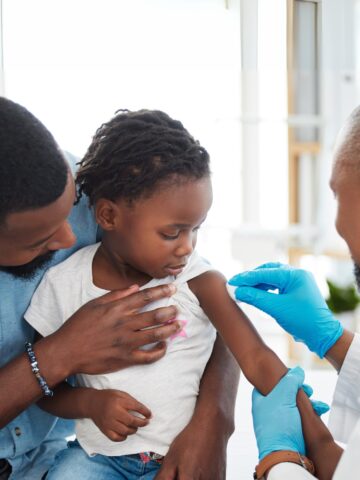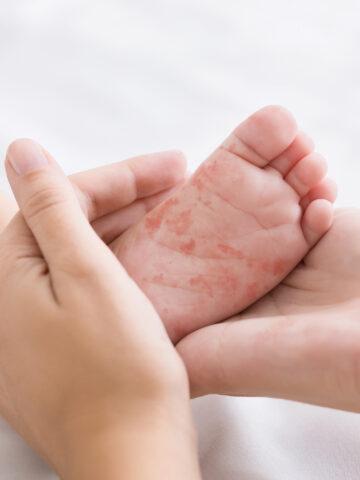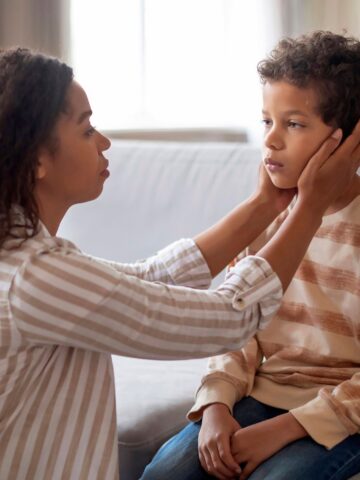A new COVID-19 variant, Omicron, is making headlines with its rapid transmission throughout the globe. As it’s making its way throughout the United States, many families may be wondering what precautions to take — especially when it comes to holiday gatherings and travel plans.
In this Q&A, Dr. Jasjit Singh, a pediatric infectious disease specialist and medical director of infection prevention at CHOC, discusses what information we currently know about the Omicron variant and what parents can do to protect their families from it.
What is the Omicron variant?
Omicron is a new variant of the SARS-CoV-2 virus which causes COVID-19 infections. According to the U.S. Centers for Disease Control and Prevention (CDC), on November 24, 2021, this new variant was reported to the World Health Organization (WHO). It was first detected in specimens collected in Botswana and South Africa.
The first confirmed U.S. case of the Omicron variant was identified in California on December 1, 2021. Now, 22 states have reported at least one case of the Omicron variant — it will likely spread to all 50 states in the next few weeks.
Is the Omicron variant a threat?
Experts are still analyzing the data on the Omicron variant, so it may be too early to determine its ultimate threat — both globally and nationally. However, in its origin in South Africa, the variant has been shown to have many mutations, meaning that there could be an increased risk of reinfection with this variant. So far, it is being detected at faster rates than COVID-19, and it may be more transmissible than the Delta variant.
What are the symptoms of the Omicron variant? Are people getting sicker with this strain than with previous strains?
Preliminary data from South Africa shows an increased rate of hospitalizations from the Omicron variant. However, this rate may be due to the low vaccination rates leading to an increased number of people being infected with COVID-19 in general —rather than just the Omicron variant.
It will take time to determine the severity of symptoms from the Omicron variant, but so far, South African physicians have described them as mild. The symptoms are the same as COVID-19 like fever, cough, loss of taste and smell and tiredness.
How does the Omicron variant affect children?
There is not enough data to tell yet, says Dr. Singh. However, according to the National Institute for Communicable Diseases, children under 2 years are accounting for 10 percent of the hospitalizations in Omicron’s epicenter of Tshwane, South Africa. This percentage resembles what was seen previously with the Delta variant in South Africa and could be due to parents taking extra precautions by bringing their very young children to the hospital.
We don’t know yet how the Omicron variant will affect children in other regions like the United States.
Does the Omicron variant spread more quickly than previous strains?
According to data from South Africa and Europe, it seems as if Omicron is highly transmissible due to detection in various countries. Although it’s too soon for any definitive data, the CDC says that the Omicron variant will likely spread more easily than the original SARS-CoV-2 virus and anyone with Omicron infection can spread the virus to others, even if they are vaccinated or don’t have symptoms.

Featured
Learn more about the COVID-19 vaccine for children and teens from the pediatric experts at CHOC
The recent emergence of the Omicron variant further emphasizes the importance of vaccinations, boosters, and prevention efforts needed to protect against COVID-19. People ages 5 years and older are eligible for the COVID-19 vaccine. All who are eligible should receive the vaccine to mitigate community spread and further mutations.
Do booster vaccines offer extra protection against the Omicron variant?
Yes. Although COVID-19 vaccinations remain effective in preventing severe disease, data suggests that vaccinations may become less effective over time at preventing infection or milder illness with symptoms. A booster shot will offer protection against the Omicron variant.
Kids ages 12 to 17 years are authorized to receive a Pfizer-BioNTech (Pfizer) booster five months after receiving the second dose of the COVID-19 vaccine. All adults ages 18 years and older are authorized and recommended to receive a booster five months after their second dose of the Pfizer vaccine, six months following their second dose of the Moderna vaccine or two months after the Johnson & Johnson vaccine.
Should families reconsider holiday travel or gatherings due to the Omicron variant?
Travel and gatherings should be done so safely with the spread of Omicron this holiday season. The American Academy of Pediatrics (AAP) suggests celebrating the holidays with fully vaccinated family and friends. Do not host or participate in any in-person festivities if you or anyone in your household has been diagnosed or exhibited symptoms of COVID-19. Gathering outdoors is the easiest way to increase ventilation.
For families who are planning to travel with children under 5 years of age who are not eligible for the COVID-19 vaccine, opt to travel by car in a private vehicle with members of your household, if possible. If you must fly, be sure to wear masks and steer clear of large groups of people. The best way to prevent the spread of COVID-19 and its variants is for vaccinated and unvaccinated people to wear masks at indoor gatherings with others.
What additional precautions should families take against the Omicron variant?
All members of your family should receive a flu vaccine. Many experts are concerned that we may have a severe flu season this year. Families can use the same prevention methods against COVID-19, flu and respiratory viruses: Wear a mask, social distance, wash your hands and receive the COVID-19 and flu vaccines.
Get more expert health advice delivered to your inbox monthly by subscribing to the KidsHealth newsletter here.
Learn more about COVID Vaccines for Children and Teens
Get answers to your frequently asked questions – and some peace of mind – with this complete guide to COVID-19 vaccines from CHOC pediatric experts.






